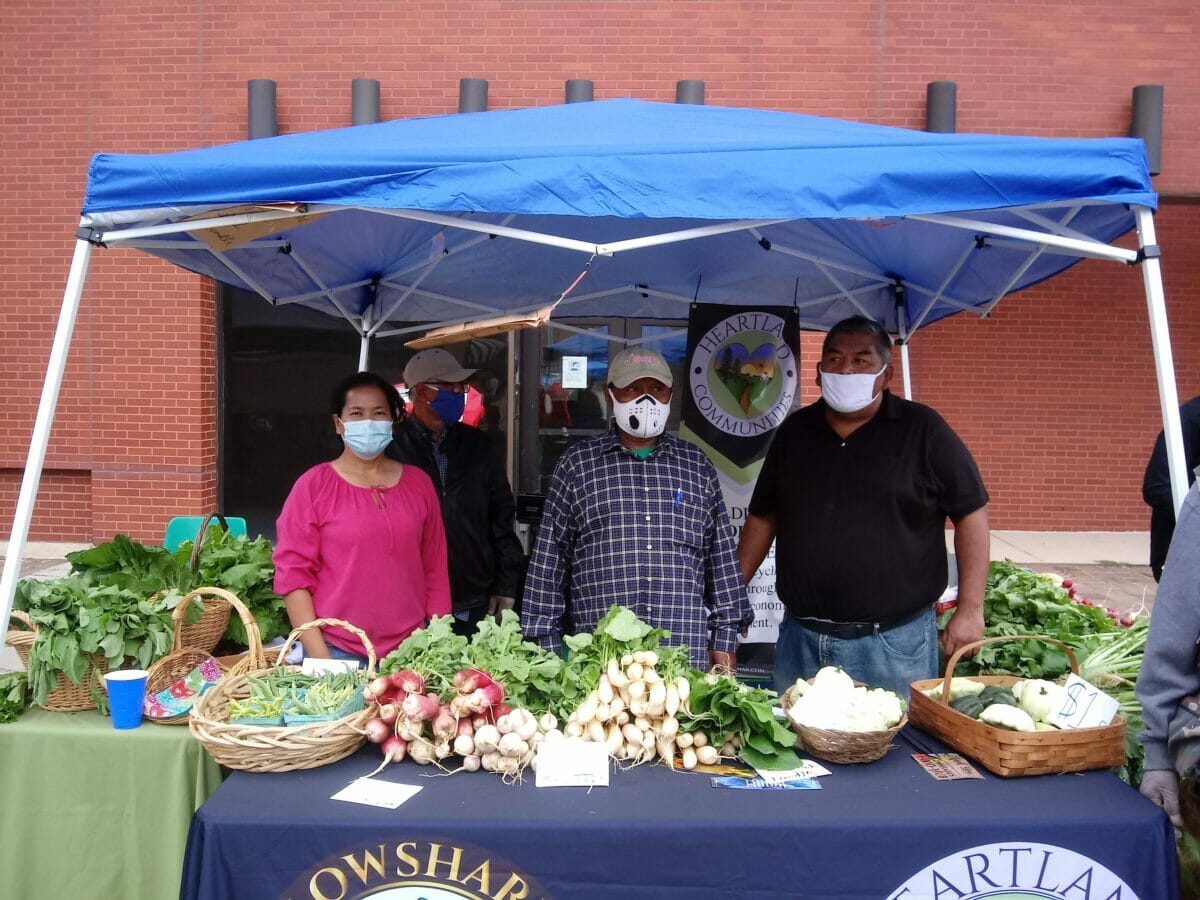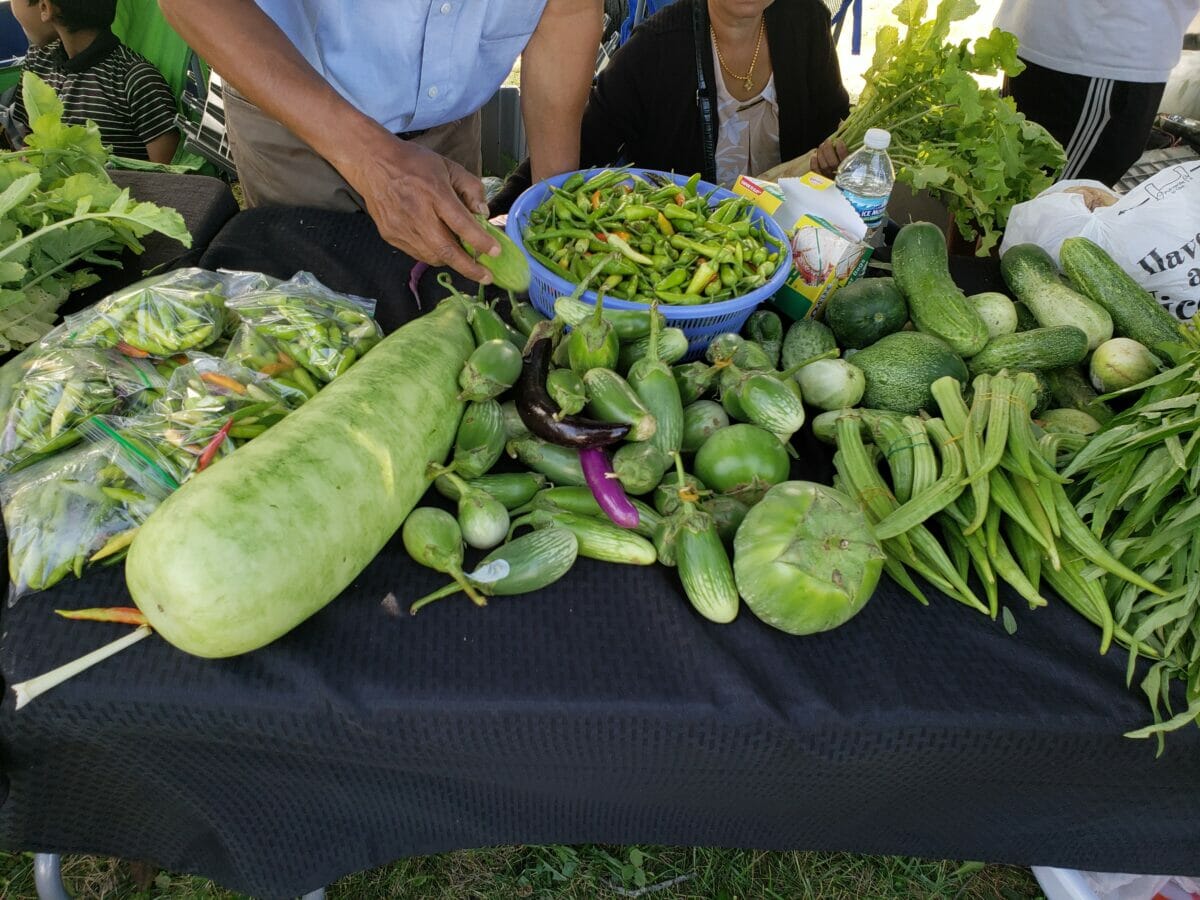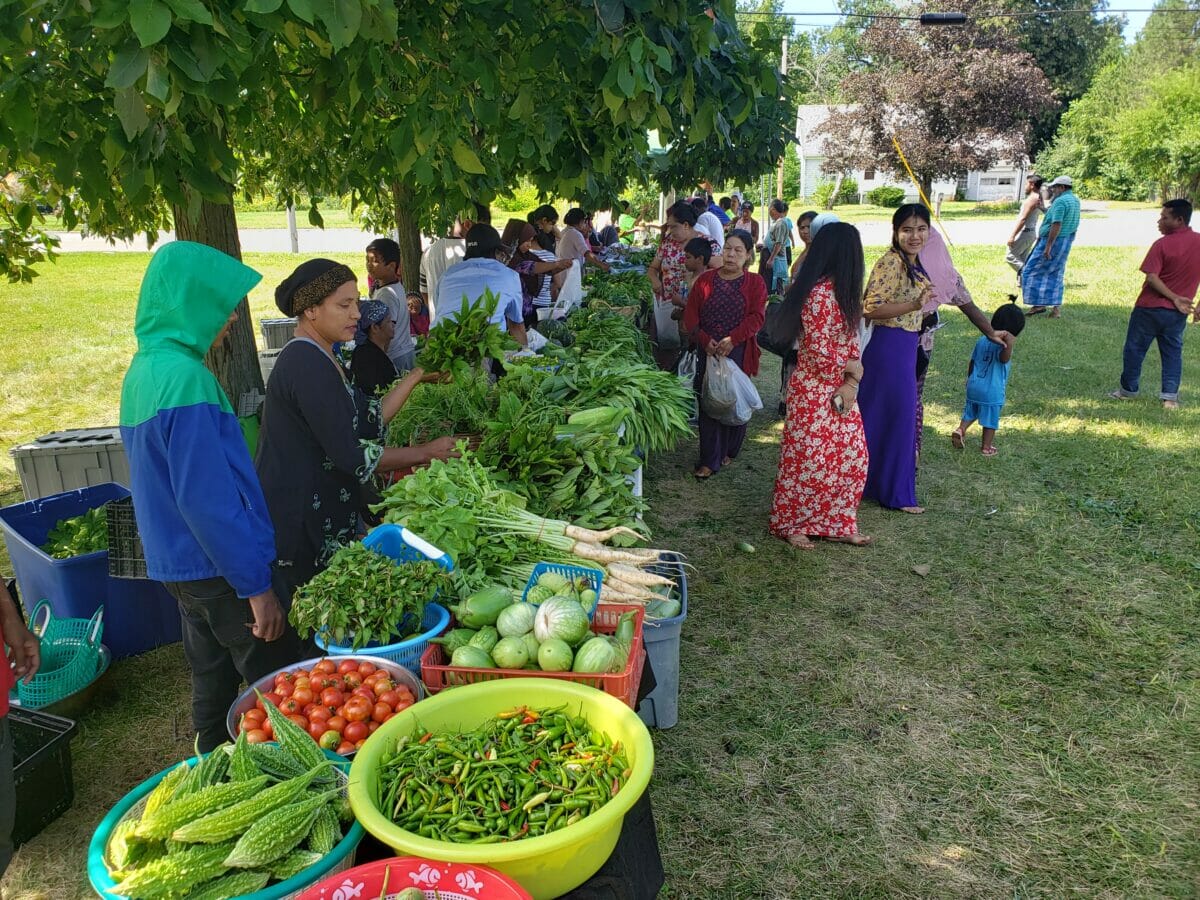The Indiana Farm Helping Burmese Refugees Reconnect With Their Roots
A refugee incubator farm in Fort Wayne is helping the community build wealth, knowledge and connections.
The Indiana Farm Helping Burmese Refugees Reconnect With Their Roots
A refugee incubator farm in Fort Wayne is helping the community build wealth, knowledge and connections.

Started in spring 2020, Rose Avenue Education Farm is helping Burmese refugees become self-sufficient farmers.courtesy of Rose Avenue Education Farm.
Fort Wayne, Indiana is home to more than 10,000 Burmese residents, one of the largest Burmese communities in the United States. Many immigrated from the Thai-Burmese border as refugees beginning in the early 1990s and, over the years, have largely been relegated to menial manufacturing jobs. But before immigrating to the United States, many of these refugees worked as farmers.
One organization is helping Burmese refugees reconnect with their roots. Rose Avenue Education Farm, founded in 2020, offers the opportunity for the local community of Burmese refugees to create sustainable careers as small-scale independent farmers. The incubator farm is a collaborative project among three local nonprofit organizations, funded by a $300,000 grant from the US Department of Health and Human Services, Office of Refugee Resettlement. At Rose Avenue, refugee farmers receive plots of land, training, technical assistance, interpreters, tools and equipment—all the resources they need to launch a startup farm and navigate the requisite taxes and bureaucracy of owning a small business.
“I came to the United States in my late 50s and I had to start over again,” says Soe Thein, who works at the farm. “I had a hard time adjusting to my life here. I worked in a factory for a short period of time and I feel like that is not me. Now my wife and I work [on] each plot and I find myself in the right place. With my income from the farm, I am financially independent. I can even help my friends.”
Last year, Save Maumee Grassroots Organization donated 10 acres of farmland to Rose Avenue Education Farm and Workers’ Project connected with the Burmese refugee community to find interested candidates. Heartland Communities chipped in to help educate farmers on local weather and organic farming practices, providing them with translators and the tools needed to become self-sufficient farmers in Indiana. Project manager Jain Young oversees the program and is equally passionate about empowering local Burmese farmers as she is about strengthening local food systems and encouraging Hoosiers to eat more locally grown foods.
“I used to do farming and livestock keeping full time back in Burma,” says Ha Run, another farmer at Rose Avenue. “When I came to the United States, I worked in a factory, but I always wanted to be a farmer again. Now my wish is fulfilled here [at] Rose Avenue Farm. I think my farmer’s blood runs in my body. I am very happy!”
Rose Avenue Education Farm started in spring 2020—farmers were fully masked and socially distanced—with nine tilled acres split among 10 Burmese families. They helped transform a corn and soy row-crop field into an intensive vegetable farm.

Each family has complete autonomy over the crops they choose to grow. Fields are planted with an array of familiar vegetables used in Burmese cuisine, including sour leaf, water spinach, bitter melon, radishes and various squashes to meet demands for Asian ingredients that can otherwise be hard to find in Northeast Indiana. The farmers sell directly to mostly fellow Burmese consumers at weekly farmers’ markets.
“In 2020, the first vegetables were harvested in mid-September and each farmer group earned a few hundred dollars by Christmas,” says Young. Sales have grown tremendously this year, in large part thanks to Plowshares Cooperative, the local food distribution co-op with which the farmers work, getting approved to accept SNAP benefits payments for fresh vegetables and St. Joseph Foundation providing matching funds for SNAP purchases. “We started our own farmers market primarily for Burmese customers on the lawn at the League for the Blind, and in 16 weekends sold more than $100,000 in EBT/SNAP purchases.”

While there was great success in selling whole, uncut vegetables to the Burmese community in Fort Wayne, growers encountered less success selling to non-Burmese Americans at the downtown farmers’ market. Young believes that mobile markets and value-added processing of their vegetables are the solution.
Heartland Communities, one of the three organizations behind the farm, recently received a second grant from the USDA Agricultural Marketing Service for a Farmers Market Promotion Program to take these next steps in farm business incubation.
“One aspect of the grant is to establish a production kitchen for value-added food products using the vegetables grown at Rose Avenue Farm,” says Young. “This will create additional revenue streams for farmers, extend the life of vegetables the farmers grow and create more jobs in food processing and fresh prepared food.”
Instead of selling vegetables as commodities, the Burmese refugee farmers would be able to sell ready-to-eat foods and meal kits at higher prices. Young believes that will appeal more to non-Burmese locals who might not regularly cook with the ingredients that they might consider specialty produce at home, especially unfamiliar ones such as bitter melon and sour leaf.
“Rather than selling cabbage for 39 cents a pound, we can sell an artisan coleslaw for $4.39 a pound,” Young says. And when the sour leaf season is finished, a lightly processed version of the plant can be simmered and frozen, ready for use and sold throughout the winter. “We want to put healthy food choices and vegetable-abundant meals easily within reach for everyone.”
Follow us

This work is licensed under a Creative Commons Attribution-NoDerivatives 4.0 International License.
Want to republish a Modern Farmer story?
We are happy for Modern Farmer stories to be shared, and encourage you to republish our articles for your audience. When doing so, we ask that you follow these guidelines:
Please credit us and our writers
For the author byline, please use “Author Name, Modern Farmer.” At the top of our stories, if on the web, please include this text and link: “This story was originally published by Modern Farmer.”
Please make sure to include a link back to either our home page or the article URL.
At the bottom of the story, please include the following text:
“Modern Farmer is a nonprofit initiative dedicated to raising awareness and catalyzing action at the intersection of food, agriculture, and society. Read more at <link>Modern Farmer</link>.”
Use our widget
We’d like to be able to track our stories, so we ask that if you republish our content, you do so using our widget (located on the left hand side of the article). The HTML code has a built-in tracker that tells us the data and domain where the story was published, as well as view counts.
Check the image requirements
It’s your responsibility to confirm you're licensed to republish images in our articles. Some images, such as those from commercial providers, don't allow their images to be republished without permission or payment. Copyright terms are generally listed in the image caption and attribution. You are welcome to omit our images or substitute with your own. Charts and interactive graphics follow the same rules.
Don’t change too much. Or, ask us first.
Articles must be republished in their entirety. It’s okay to change references to time (“today” to “yesterday”) or location (“Iowa City, IA” to “here”). But please keep everything else the same.
If you feel strongly that a more material edit needs to be made, get in touch with us at [email protected]. We’re happy to discuss it with the original author, but we must have prior approval for changes before publication.
Special cases
Extracts. You may run the first few lines or paragraphs of the article and then say: “Read the full article at Modern Farmer” with a link back to the original article.
Quotes. You may quote authors provided you include a link back to the article URL.
Translations. These require writer approval. To inquire about translation of a Modern Farmer article, contact us at [email protected]
Signed consent / copyright release forms. These are not required, provided you are following these guidelines.
Print. Articles can be republished in print under these same rules, with the exception that you do not need to include the links.
Tag us
When sharing the story on social media, please tag us using the following: - Twitter (@ModFarm) - Facebook (@ModernFarmerMedia) - Instagram (@modfarm)
Use our content respectfully
Modern Farmer is a nonprofit and as such we share our content for free and in good faith in order to reach new audiences. Respectfully,
No selling ads against our stories. It’s okay to put our stories on pages with ads.
Don’t republish our material wholesale, or automatically; you need to select stories to be republished individually.
You have no rights to sell, license, syndicate, or otherwise represent yourself as the authorized owner of our material to any third parties. This means that you cannot actively publish or submit our work for syndication to third party platforms or apps like Apple News or Google News. We understand that publishers cannot fully control when certain third parties automatically summarize or crawl content from publishers’ own sites.
Keep in touch
We want to hear from you if you love Modern Farmer content, have a collaboration idea, or anything else to share. As a nonprofit outlet, we work in service of our community and are always open to comments, feedback, and ideas. Contact us at [email protected].by Amber Gibson, Modern Farmer
November 20, 2021
Modern Farmer Weekly
Solutions Hub
Innovations, ideas and inspiration. Actionable solutions for a resilient food system.
ExploreExplore other topics
Share With Us
We want to hear from Modern Farmer readers who have thoughtful commentary, actionable solutions, or helpful ideas to share.
SubmitNecessary cookies are absolutely essential for the website to function properly. This category only includes cookies that ensures basic functionalities and security features of the website. These cookies do not store any personal information.
Any cookies that may not be particularly necessary for the website to function and are used specifically to collect user personal data via analytics, ads, other embedded contents are termed as non-necessary cookies.
Such an exciting endover